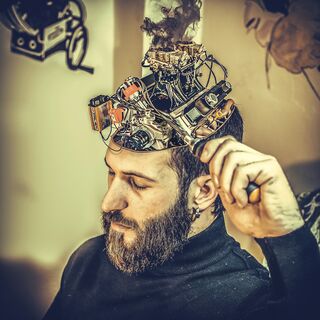Psychology
Understanding Forensic Neuropsychopathology
An emerging field that is another facet of science and the law.
Posted April 1, 2021 Reviewed by Jessica Schrader

For decades, forensics has played a pivotal role in solving crimes and has been the catalyst for scientific discoveries within the criminal justice system. Also known as criminalistics, forensics is applying various sciences such as biology, computer science, engineering, and physics and provides findings that help resolve civil and criminal court cases. Mental health experts recognized similar scientific and legal concepts exploring individuals' psyche and understanding how mental health illnesses impact decision-making in civil and criminal matters. This new sub-discipline led to forensic psychology.
A progressive sub-practice, forensic psychology, was conceptualized in the early 1990s; however, it was not recognized by the American Psychological Association until 2001 when the organization revised its specialty guidelines (American Psychological Association [APA], 2013a). The field comprises clinical treatment programs, consulting, expert witness testimony, psychological assessments, scientific investigations, and research. One of the leading practices in forensic psychology is conducting competency and insanity assessments to determine if an individual is competent to stand trial (Hoge, 2016).
Forensic psychologists work in various settings such as hospitals, correctional facilities, research laboratories, advocate organizations, or law enforcement agencies to assist the legal system with assessing and diagnosing individuals suspected of committing crimes. From the American Board of Forensic Psychology's establishment to becoming part of the American Board of Professional Psychology for licensed psychologists to become board-certified and nationally recognized, the forensic psychology field has become well-respected within the civilian and military justice systems.
Defining Forensic Neuropsychopathology
For the last three decades, the evolution of psychology and science justifies the need for further study in how severe mental illnesses impact different structures of the brain. Additionally, these investigations are pivotal in examining how other cortical structures of the brain are influenced by severe mental diseases and the effects on human behavior and physiological symptoms.
Neuropsychology is a division of psychology that focuses on how the brain and nervous system impact cognition and behaviors (APA, 2020b). Most importantly, neuropsychology centers on the functioning of the brain as it relates to brain damage and impairment. Forensic neuropsychology is the “application of clinical neuropsychology practices to both civil and criminal law, particularly those relating to claims of brain injury” (APA, 2020c, para. 1). Psychopathology is the “scientific study of mental disorders that are based on theoretical underpinnings, etiology, progression, symptomology, diagnosis, and treatment” (APA, 2020d, para. 1). It is also the behavioral and cognitive manifestations of mental disorders and is interchangeable with abnormal psychology (APA, 2020d).
Forensic neuropsychopathology is the combination of clinical neuropsychological practices and the scientific study of mental disorders that pertain to decision-making within the civilian and military legal systems (Chouraeshkenazi, 2021a). Over the past 20 years, there has been an increase in violent crimes committed by individuals that have been diagnosed with a severe mental illness (Chouraeshkenazi, 2021b). As a result, additional research in a more specialized field, such as forensic neuropsychopathology, can better understand the impact mental illnesses have on brain functioning and the nervous system.
Understanding Forensic Neuropsychopathology

Forensic neuropsychopathology combines neuropsychological principles and practices to the scientific study of mental disorders, as it applies to legal settings. This emerging field aims to provide clinical and scientific data based on empirically validated neuropsychological methodologies to examine how mental illnesses impact different brain structures and how that is explained within a legal text.
Advanced research can potentially identify abnormal brain conditions, linking this information with psychological comorbidities. These processes are vital in analyzing forensic data to answer the following questions: How do long-term mental illnesses affect brain functioning and the nervous system? How do short-term conditions impact braining functioning and the nervous system? Is possible impairment permanent? Can it be reversed? Can the brain recover from long-term severe mental illness? Are people responsible for the acts committed due to severe mental illness? Are competency and insanity significant factors when dealing with severe mental illness cases? How should the legal system handle such matters?
Forensic neuropsychopathology is the advanced health care initiative of the future. The field is needed to examine the complexities of the brain and the nervous system and how this scientific and medical data is interpreted in a legal context to improve our civil and military court systems' decision-making processes. Additional studies warrant further investigation on if the brain can recover from severe mental illness cases. Such phenomena are vital for better understanding the relationship between forensic, neuroscience, and legal matters to improve mental healthcare initiatives. Distinctive, scientifically-based studies on brain impairment and severe mental illness diagnoses to assess if such impairment is long-term, short-term, or can fully recover from brain structural changes are paramount in understanding individuals’ mental health conditions. The new direction of forensic neuropsychopathology can improve legal practices through refining assessment processes, diagnostic clarity, and treatment options of individuals who suffer from severe mental illnesses.
References
American Psychological Association. (2020a). Neuropsychology. https://dictionary.apa.org/neuropsychology
American Psychological Association. (2020b). Forensic neuropsychology. https://dictionary.apa.org/forensic-neuropsychology
American Psychological Association. (2020c). Psychopathology. https://dictionary.apa.org/psychopathology
Chouraeshkenazi, M. M. (2021a). A forensic neuropsychological review on different brain structures in combat veterans. [Unpublished doctoral dissertation, California Southern University].
Chouraeshkenazi, M. M. (2021b). Violent crimes among U.S. male service members following 9/11: How PTSD and comorbid psychopathologies impact force structure, mission readiness, and national security interests. [Master's thesis, American Military University]. Open Science Network. https://doi.org/10.17605/osf.io/n2P68
Hoge, S. K. (2016). Competence to stand trial: An overview. Indian Journal of Psychiatry, 58(2), 187-190. https://doi.org/10.4103/0019.5545.196830


